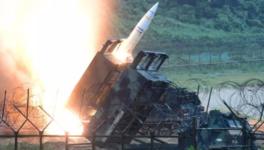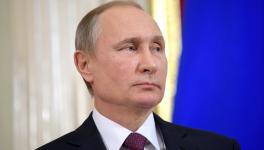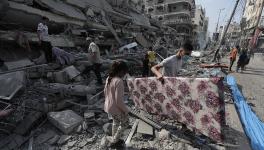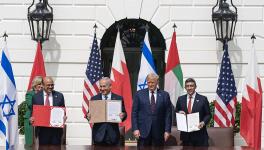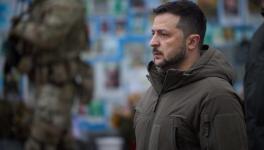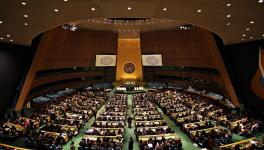Turkey threatens to pull the plug on US
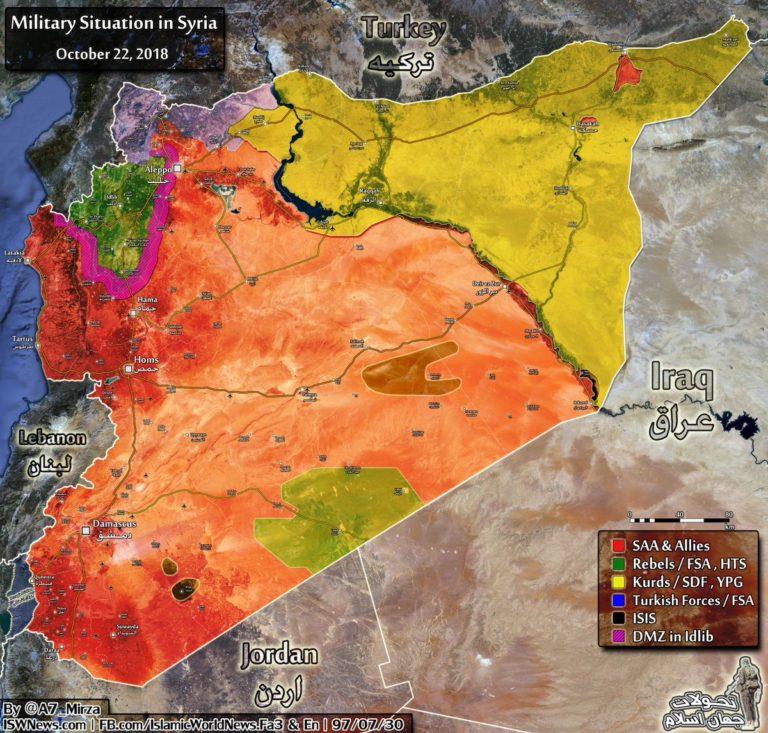
Who controls what in Syria, October 2018
An impression has been gaining ground lately that the Trump administration is making overtures to Ankara to revive the original US-Turkish project on regime change in Damascus. The recent visit to Ankara by James Jeffrey, the US special representative to Syria, was seen in that light.
Prior to his trip to Ankara, Jeffrey openly suggested at a briefing at the US state department on December 3 that the Astana process on Syria (involving Russia, Turkey and Iran) should be wound up since it failed to advance the political process. As he put it, “US view … is let’s pull the plug on Astana.” In essence, Jeffrey ’s game plan was to somehow break up the Russian-Turkish-Iranian axis in Syria so that the US can tackle each of these three protagonists from a position of advantage.
However, the contradiction here is the US’ alliance with the Kurds, which is anathema to Turkey. Jeffrey tried to fudge this contradiction by saying, “Our policy is to work with the people of the northeast first of all to defeat ISIS… We have no political agenda either with the Kurdish groups, with the Arab groups, or with any other groups inside Syria. Our position is (a) the territorial integrity of Syria under its present borders; (b) we will work with all political forces that are willing to recognize and accept the UN political process and the basic criteria of all of these UN initiatives since 2012 on Syria, which is no threat to the neighbors, no threat to the population, no use of chemical weapons, no support for terrorism, no mass slaughter of one’s own civilians, and accountability for war crimes. That’s our position with everybody and anybody.”
But Turks refuse to be taken for a ride. If anything, the Turkish suspicions regarding the American intentions in northern Syria have only deepened. Two recent developments contributed to this:
One, the US move to establish observation posts next to Turkey’s border. Washington claims that these OPs will prevent possible terrorist threats against Turkey. But Turks are not duffers and they understand perfectly well that the real reason behind this Pentagon decision (announced innocuously almost as an aside by Defence Secretary James Mattis two weeks ago) is to prevent any Turkish operation against the Kurdish forces in northern Syria.
Two, the US disclosure (by the outgoing chairman of joint chiefs of staff Gen. Joseph Dunford) that “35,000-40,000 local forces need to be trained to provide stability” in the territories occupied by the US in northeast Syria. Without doubt, the alarm bells must have rung in Ankara that the US is moving in the direction of creating security underpinnings for an autonomous Kurdistan in Syria similar to what it achieved in Iraq following the Gulf War in 1990-91.
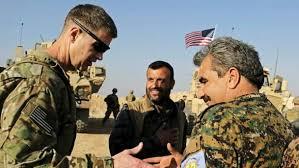
(US general Jamie Jarrord greets Kurdish commander Muhammed Abu Adeel in Manbij, February, 2018)
Taken together, Turkish leadership realizes that unless Turkey forcefully acted to thwart the US strategy before it is too late, Ankara may face the stark choice of an independent Kurdish entity appearing along its border with Syria, which of course would imperil Turkey’s own security, territorial integrity and even threaten its unity. Thus, President Recep Erdogan had no option but to announce on Wednesday that Turkey proposes to launch a military operationagainst the Syrian Kurdish groups in a “few days”.
Erdogan said, “It is time to realize our decision to wipe out terror groups east of the Euphrates. We will start the operation in east of the Euphrates in a few days to save it from the separatist terrorist organization. Turkey’s target is never the US soldiers, but rather the members of the terror group.”
Erdogan rejected outright the US move on setting up OPs along Turkish border, saying, “It is clear that the purpose of US observation points in Syria is not to protect our country from terrorists but protect (Kurdish) terrorists from Turkey.” Meanwhile, other Turkish officials have cast aspersions on the US plan to train 40000-strong local militia and Jeffrey’s diatribe against the Astana process.
Conceivably, Turkish officials conveyed to Jeffrey Ankara’s plans to launch military operations against Syrian Kurds. At any rate, no sooner than Erdogan spoke on Wednesday, Washington reacted sharply, expressing “grave concern” and warning that any such Turkish military operations in Syria will be “unacceptable.”
However, all indications are that preparations are complete on the Turkish side of the border for the military strike. A Turkish daily close to the ruling circles reported that the operation will be carried out with “point shots” – namely, precisely targeting concentrations of the Syrian Kurdish militia. Some 200 such targets have been reportedly identified. Indeed, the Turkish armed forces have the capability to shoot at these targets from the air and ground without entering Syrian airspace and territory. One possibility is that Turkish jets can strike the Kurdish targets from a 30-kilometer depth in the air, while the howitzers can strike up to a depth of 40 kilometers on the ground.
Other reports have claimed that over the past fortnight, there have been significant military deployments to the Syrian border with armored vehicles, tanks and personnel deployed from Şanlıurfa to Akçakale. The plan seems to be that strategic targets of the Kurdish forces will be hit initially with a view to rapidly clear a swathe of Syrian territories so that fighters of the so-called Free Syrian Army (Syrian opposition groups aligned with Turkey) can move into the area.
Indeed, if Erdogan carries out his pledge, it will put the US in an unenviable position of having to watch passively when its allies get pulverized by the jets and artillery. It will be a huge loss of face for the US and, importantly, it will render the best-laid American plans for an open-ended occupation of Syria unviable and senseless.
Without doubt, Moscow and Tehran will be pleased with Erdogan’s resolve to frustrate the US game plan to divide Syria. Around 30 percent of Syrian territory is presently under American occupation. Some US analysts have openly estimated that if only Turks could be brought on board, that would increase the area to around 40 percent of Syrian territory and eventually help provide an outlet for that land-locked enclave (which also contains Syria’s oil fields) to the Eastern Mediterranean coast and access to the world market.
The heart of the matter is that other than rhetorically, Russia shies away from challenging the US occupation of Syria lest it led to military confrontation, which Moscow has been scrupulously avoiding, no matter the provocations from the American side (eg., drone attacks on the Russian bases in Syria.) As for Iran, it is fighting an existential battle to counter the US sanctions and a confrontation with the US in Syria is not the priority today. Damascus cannot hope to confront the US by itself, either.
Thus, unsurprisingly, a note of triumphalism had lately crept into the US stance – all but implying that the Americans are salvaging victory out of the jaws of military defeat in the Syrian conflict and that it is a matter of time before Russia finds itself in a quagmire, keeping afloat the regime in Damascus out of its own meager resources and increasingly feeling the financial crunch, with Washington effectively plugging any help for Syria’s reconstruction coming from the western allies by making all such aid conditional on the removal of President Bashar al-Assad from power.
No doubt, the simmering US-Turkish tensions in northern Syria over the Pentagon’s alliance with Syrian Kurdish groups have surged. It will be hard landing for the Pentagon if the long-awaited Turkish crackdown begins against the US’ Kurdish allies in Syria.
(This article also appeared on Indian Punchline)
Get the latest reports & analysis with people's perspective on Protests, movements & deep analytical videos, discussions of the current affairs in your Telegram app. Subscribe to NewsClick's Telegram channel & get Real-Time updates on stories, as they get published on our website.









